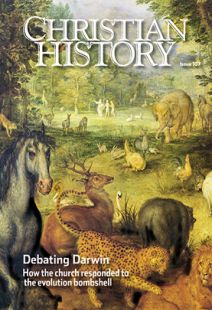Did you know?
Darwin almost missed the boat
Among the careers Darwin considered before making his fateful Beagle voyage was medicine (his father’s choice). But his attempt to become a doctor was foiled by his inability to stand the sight of blood. When the voyage was proposed, he was not the first choice, and when he was offered a position, his father turned it down on his behalf. When Darwin finally did make it onto the boat, he was seasick for most of the voyage—one of the reasons he spent so much time off the boat collecting specimens on solid ground.
favored races
The full title of Darwin’s book was On the Origin of Species by Means of Natural Selection, or the Preservation of Favoured Races in the Struggle for Life. Darwin did not argue there that humans descended from nonhuman ancestors. That book came a little over a decade later, in 1871: The Descent of Man and Selection in Relation to Sex. Much of the controversy over Darwin’s theories followed this later book. During Darwin’s own lifetime, neither sold as well as his last book—on earthworms.
living in a material world
In 1984 pop star Madonna crooned about being a material girl in a material world, but was she aware of the intel- lectual roots of the word? Philosophically “materialism” means that “matter” is the only thing in the universe—that thoughts, feelings, and even the soul are ultimately reducible to aspects of physical reality. This was an intellectual trend in the eighteenth and nineteenth centuries, and some Christians thought Darwin fit right in—that his theory was “godless materialism“ that explained existence without any reference to spiritual realities.
Different strokes
Scientists responded differently to Darwin in different places. There were many questions in New Zealand about whether its original inhabitants should have land rights, or whether they had been proven “unfit” in the struggle with white settlers. So scientists there seized on struggle as the fundamental principle in Darwin’s theory. But half a world away, most Russian naturalists conducted their field work in Siberia, where populations were not dense and cooperation was crucial for a group’s survival. Their version of Darwin’s theory replaced the struggle element with cooperation.
Darwin debates himself
In a note jotted down while single, Darwin cited as reasons for marrying: “Children — (if it Please God) — Constant companion, (& friend in old age) who will feel interested in one, — object to be beloved & played with. —better than a dog anyhow. — Home, & someone to take care of house — Charms of music & female chit-chat. — These things good for one’s health. — Forced to visit & receive relations but terrible loss of time.”
Reasons for not marrying included “Freedom to go where one liked — choice of Society & little of it. — Conversation of clever men at clubs — Not forced to visit relatives, & to bend in every trifle. — to have the expense & anxiety of children — perhaps quarrelling— Loss of time. — cannot read in the Evenings — fat- ness & idleness — Anxiety & responsibility — less money for books &c — if many children forced to gain one’s bread. — (But then it is very bad for ones health to work too much).”
“Marry” won out. He married his first cousin Emma Wedgwood (granddaughter of famous potter Josiah Wedgwood); their union lasted 43 years and produced 10 children. They played two games of backgammon every night, and he kept score, priding himself at one point on having won “2,795 games to her piddling 2,490.”
“things which cannot be proved”
Shortly after their marriage, Emma (devoutly religious her whole life) wrote Charles a letter expressing concern about his changing views on religion: “May not the habit in scientific pursuits of believing nothing till it is proved, influence your mind too much in other things which cannot be proved in the same way . . . I should say also that there is a danger in giving up revelation which does not exist on the other side, that is the fear of ingratitude in casting off what has been done for your benefit as well as for that of all the world.” CH
By the Editors
[Christian History originally published this article in Christian History Issue #107 in 2013]
Portions of this text come from an interview with historian David Livingstone. “Darwin debates himself,” and “Things which cannot be proved” are taken from The Complete Work of Charles Darwin Online.Next articles
Editor’s note: Debating Darwin
History turns out to be more complicated than we expect
Jennifer Woodruff TaitDivine designs
Conservative Christians moved from cautious consideration of Darwin to outright rejection
Edwin Woodruff TaitTheology, reconstructed
Liberal Protestants hoped to accommodate evolution and Christianity
Jon H. RobertsSupport us
Christian History Institute (CHI) is a non-profit Pennsylvania corporation founded in 1982. Your donations support the continuation of this ministry
Donate



